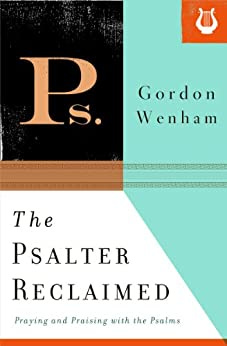Many of you will know by now my deep love for the Psalms, and conviction that they ought to have a greater place in our individual and corporate life. This book begins by making the case that the psalms have had (and should have!) a profound impact on theology and ethics, that they have been and are meant for both singing, but also memorisation and prayer, and that the Psalter as a collection is deliberately arranged with these things in mind. Wenham begins with a review of the place of the psalms in church life throughout the ages (though amidst all the gems here is the requirement that bishops know the Psalms by heart). He then turns to consider speech-act theory, and the way in which the act of speaking the psalms, actually makes them function - we declare our faith and commitment to God; it is a performative act; these are texts not merely for listening, but for saying.
Chapter two lays out a succinct case for praying the psalms. I'm going to summarise it even further here for us:
They teach us how to praise God
for his goodness to us
for answered prayer
for the Law
They teach us how to lament; and here is the case for lament:
Laments are the most quoted psalms in the NT
Jesus prayed laments
Revelation contains a psalm-based lament
The early church used these
Not everyone who comes into church, comes full of joy and happiness
Those of us not going through difficulties, learn to sympathise and come alongside those who are
They teach us how to confess and repent
They point to the Messiah
The central sections of the book work hard to connect biblical scholarship across the spectrum, and recent trends, with how we understand and read the Psalms as a collection. And so chapter 3 is about the Psalter as a canonical collection - what do we learn by the way the Psalms are arranged, their five books, their placement and order, their titles. Among the insights here is that the way in which the Psalms are 'the songs of David', they also become the 'songs for each and every ordinary believer'. Chapter 4 tackles the issue of the Psalms as Messianic texts. Can we read them that way? (Yes) How do we get there? A careful reading of both the contents, and arrangement, of the psalms point to the ways in which the psalms take the Davidic king as a type, and point beyond historical David and Solomon, to a future Davidic king, who will fulfil eschatological hopes.
Chapter 5 tackles the ethics of the Psalms, and it starts out kind of slow and not incredibly interesting, but then it turned incredibly interesting by talking about hesed, so interesting that I turned it into a post all by itself.
Chapter 6 is also amazing. I might write about it separately some time as well, but it tackles the difficult question of the imprecatory psalms - what do we do with those psalms that call down destruction and vengeance upon enemies? Are the befitting to a New Testament faith? Can Christians use them? How?
Wenham surveys some past approaches, and then lays out Zenger's view. I'd never heard of Zenger, but I'm now intrigued enough to probably read his book. So:
Zenger then argues that a belief in divine judgment is essential in a world where there is much suffering, oppression, and justice. If we do not believe in this judgment, we have no gospel to offer to the suffering world. p140
Zenger wants us to take seriously the violence in the psalter and the violent psalms, and genuinely dialogue with what they are saying. Then he makes an important hermeneutic move - we need to refocus our understanding of them by stopping our own centring of our feelings. In particular, we need to recover a vision of the Last Judgement as
is the time when all the injustice and suffering of the world will be ended, which is why the early church prayed so fervently for the second coming. p142
Then
According to Zenger, modern Christians have forgotten or suppressed the idea that the day of judgment is to bring justice to the victims of injustice—a day when God will restore the world to what it should be—and to confront the wicked with the reality of their sin and its consequences. p142-143
This view, instead of a highly individualised "God will just bring each of us before him and judge us for our deeds", is a view of a God who hates evil, loves good, and will not permit evil to go on forever, a God who loves enough to destroy evil forever, and to deliver justice for those denied it.
We could say more here, but I think this is the right track. I think we do need to say more, especially in light of the cross. And I'd like to say some things about how to frame the use of these psalms individually and corporately. But that will need to wait.
Chapter 7 is a close and canonical reading of Psalm 103, very valuable in itself. Chapter 8 is a look at the 'Nations' in the psalms, another fine study. All the chapters of this book were given as papers, so this is a bit of an anthology book, but the overall coherence is reasonably high.
All in all, a good read and valuable fodder for my own thinking on how to make the psalms 'work' in prayer and song.


